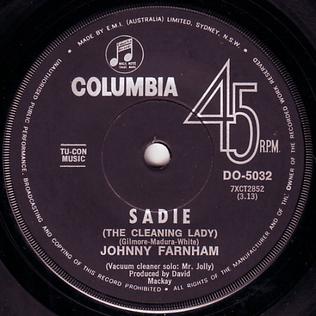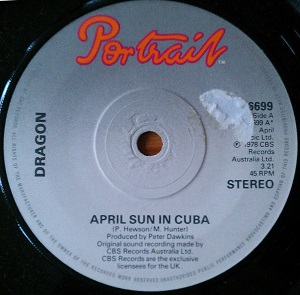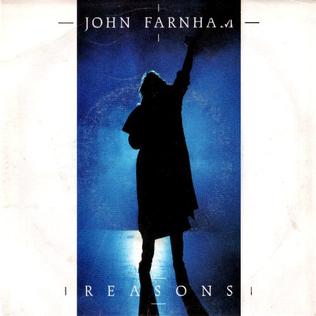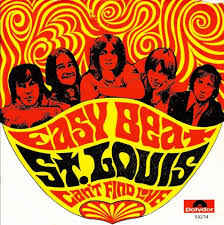
Species Deceases is an extended play by Australian rock band Midnight Oil, released on 26 November 1985 under the CBS record label. Species Deceases debuted at No. 1 on the Australian Kent Music Report Singles Chart for six weeks from December 1985 to January 1986. It was the first Australian single and/or EP to reach the number-one spot on its chart appearance and remains Midnight Oil's only No. 1 on the national singles chart.

The ARIA Charts are the main Australian music sales charts, issued weekly by the Australian Recording Industry Association. The charts are a record of the highest selling songs and albums in various genres in Australia. ARIA became the official Australian music chart in June 1988, succeeding the Kent Music Report, which had been Australia's national music sales charts since 1974.

"Sadie (The Cleaning Lady)" was Australian pop singer Johnny Farnham's first solo single. The novelty song was released in November 1967 and was No. 1 on the Go-Set National Singles Charts for five weeks in early 1968 (six weeks on the Australian charts in 1968 based on the Kent Music Report). It was the largest-selling single in Australia by an Australian artist in the 1960s.
Robert Hudson is an Australian singer, radio presenter and archaeologist. His satirical narrative, "The Newcastle Song", topped the Kent Music Report singles chart. He also wrote and recorded, "Girls in Our Town", which was covered by Margret RoadKnight in January 1976 and Judy Small in 1982.

"No Promises" is a song by Australian band Icehouse, released in October 1985, as the first single issued from the band's 1986 album, Measure for Measure. The single was released in Australia through Regular Records, on 7", 12" and maxi-cassette single formats. Chrysalis Records issued the single in the UK and Europe on 7" and 12" formats, with different track listings. "No Promises" was subsequently released in the US by Chrysalis on 7" and 12" formats, again with different track listings. The single peaked at #30 on the Australian singles chart in February 1986. A remixed version by (Love) Tattoo was included on the Icehouse remix album Meltdown in 2002. Two music videos were filmed to promote the single; the second of these was directed by Dieter Trattmann.

John Farnham, billed under stage name Johnny Farnham from 1964 until 1979, is a British-born Australian pop singer who has released 21 studio albums, 6 live albums, 3 soundtracks, 19 compilation albums, 13 video albums, 3 extended plays and 74 singles.
David Cyril Kent is an Australian music historian and pop culture writer. Kent produced the Kent Music Report, compiling the national music chart from May 1974 to 1996; it was known as the Australian Music Report from 1987. The music reports were a weekly listing of the National Top 100 chart positions of singles and albums.

This is the discography for the British pop singer Sandie Shaw.

"Wedding Ring" is a song written by Stevie Wright and George Young. It was originally recorded by the Australian rock group the Easybeats in 1965, whose version reached #6 on the Australian charts.
The Seekers were an Australian folk music group formed in 1962 consisting of Athol Guy, Keith Potger, Bruce Woodley and Judith Durham.

The discography of English-born, Australian rock singer-songwriter Jon English.

"April Sun in Cuba" is a song recorded by New Zealand group Dragon, released in October 1977. It is the first single to be released from Dragon's fourth studio album Running Free. "April Sun in Cuba" first charted on 7 November 1977, peaking at number 2 on the Kent Music Report Singles Chart and staying on the chart for 22 weeks. It also reached number 9 on the New Zealand singles chart. The b-side of the single, a non-album track called "Telephone", was credited to "Dr. Agony".

"Pressure Down" is a song written by Harry Bogdanovs, recorded by Australian singer John Farnham. The song was released as the second single from his 1986 album Whispering Jack.

"Reasons" is a song written by Sam See recorded by Australian singer John Farnham. The song was released as the fourth and final single from his album Whispering Jack (1986).

"Sugar Free" is a song from Australian pop group Wa Wa Nee. The song was released in December 1986 as the third single from their self-titled debut studio album. The song peaked at number 10 on the Australian singles chart, and number 35 in the US on the Billboard Hot 100.

"Peculiar Hole in the Sky" is a song written by Harry Vanda and George Young. It was originally recorded by the Australian rock group the Easybeats in 1967, but left unreleased until 1969. The song would later be given to Australian rock group, The Valentines, which included singer Bon Scott, who would later join George Young's brothers Malcolm Young and Angus Young in AC/DC. The Valentines version would be released in August 1968.

"St. Louis" is a song by Australian rock group the Easybeats, which was released in June 1969. It was co-written by its members Harry Vanda and George Young and recorded as their first single after signing to Polydor Records.

The albums discography of English singer Cliff Richard consists of 49 studio albums, seven soundtrack albums, 11 live albums, three cast recording albums, 17 mainstream compilation albums, one remix album, 12 box sets, eight gospel compilation albums and 47 EPs. It also includes numerous budget/mid-price compilation albums, repackaged albums, and foreign compilation albums.















